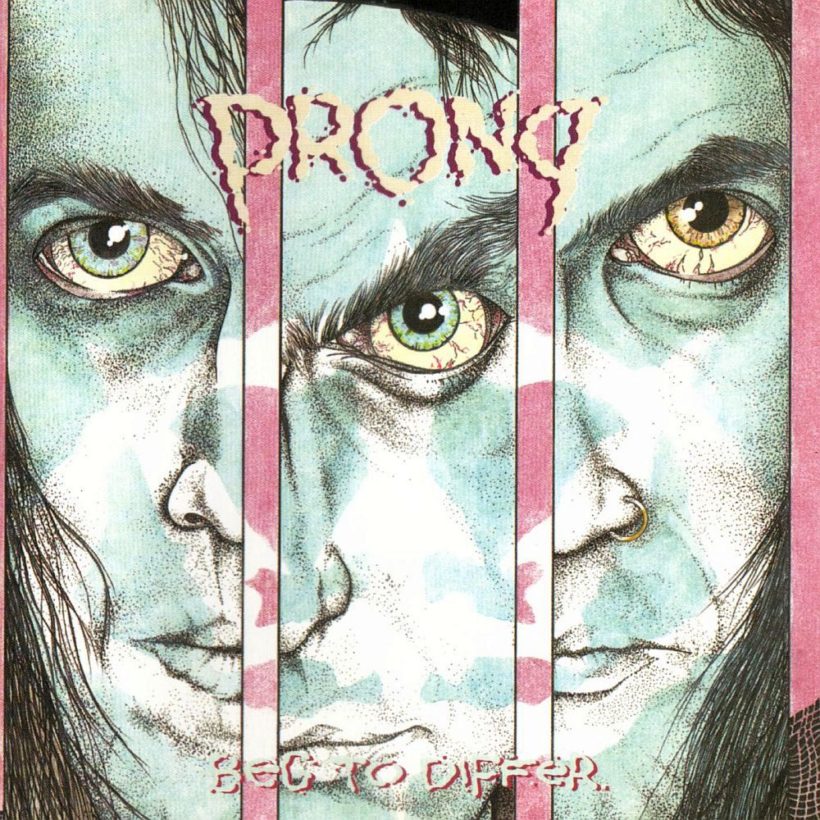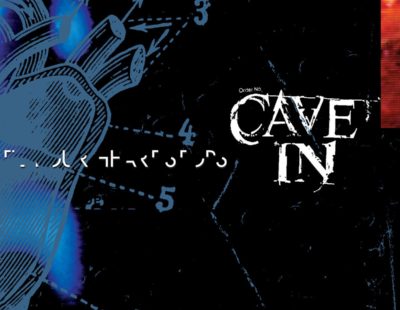
Prong really announced their arrival in 1990 with Beg to Differ; the band had been around for a while before that album, putting out a solid LP and EP, but this was different (also: it’s worth thinking twice about that release date, as 1990 is pretty early for some of the sounds the band laid down on this record). While those releases lived hard in the sewers of New York punk and British post-punk, Beg to Differ found the band hopping over to a major label for a groove-focused piece of forward-thinking metal. But the hardcore and post-punk sounds remained, Prong creating a truly unique album for the ages.
Our own Chris Dick inducted Beg to Differ into our Hall of Fame in our October 2017 issue. Grab a copy here, or go digital here, and crank up Beg to Differ now while revisiting these classic songs, rated here from worst to best (note: not putting the live cover of Chrome’s “Third From the Sun” on here; it’s not a bonus track but always kinda felt like it, and it’s a cover, and it’s live).
10. Intermenstrual, D.S.B.
This instrumental just kinda sounds like the mean medium of most of the groove-based songs on this album; you just keep waiting for the vocals to come in, and they don’t, but instead we get a fun riff and drum workout, a song that’s good but not great, a bad play on words in the song title, and then it’s over and done. Kinda neat how that opening and closing riff hints at the next album’s (awesome) title track, though.
9. Prime Cut
A good song, Prong using repetition and slow-burn groove dynamics to their advantage, the track actually working pretty good at the late point its placed on the album. Taken out of context, it’s simply a solid Beg-era Prong track, but not spectacular. But, yeah, while listening to the album, it works very well, the band chuckling at you, weak listener, mumbling, “You need room to breathe? Here, take this.”
8. Just the Same
This song is actually really great, and if it wasn’t surrounded by songs that are really, really great, it would place higher. I love the frantic speed and energy the band injects into it, ending the album with one of its most hardcore songs, a cool and fun move considering the band’s roots. It lacks the hypnotic appeal of some of the album’s groovier tracks, but it’s worth getting to know just the same.
7. Right to Nothing
Interesting one, this: love the chorus (sometimes it gets stuck in my head when I haven’t revisited this album in years) but the verses sort of meander past without much to them, although that could be due to its late-album placement more than anything. Love the rising guitar solo and, man, it should probably be repeated: that’s a great chorus, Prong just plowing it into us, over and over and over.
6. Take It in Hand
And just like that, six songs in, the hardcore returns, Prong utilizing a punk tempo for the verses of this cool song, then taking it back to a familiar slower groove for the very catchy chorus. Then they take it even slower, to one of the album’s sludgiest parts, the band reminding us that they actually had a bit more nuance to their music than we tend to give them credit for.
5. Your Fear
In which Prong slow it down for a bit of breathing room five songs in, but only sort of, as soon enough the pace picks up and the band settles in to what is still essentially a mid-paced mood rocker, Prong ending up somewhere between groove metal, noise rock, and post-punk, a genre they often brought into their sound over the years. In some moods and situations, this song rates higher, its atmosphere of mood versus the sledgehammer assault of most of the rest of the album powerful and engaging.
4. Steady Decline
This song is an exercise in proving how Prong’s songwriting chops had improved since their earlier output, the band using dynamics and groove to write a groove-metal earworm that doesn’t stink up the joint like most “groove metal earworms” tend to. Plus, let’s not underestimate the strange, almost noise-rock vocal lines and melodies that the band was leaning on pretty hard during this era, which helped create the very unique sound and vibe of Beg to Differ. Love the riffing, love the vocal delivery, love the “quick, go faster!” ending, love the song.
3. For Dear Life
A great opener, “For Dear Life” established pretty quick that Prong had changed from their early hardcore days, although the band’s scrappy New York sound remained, but a new sense of groove (and cowbell!) dominated this song, the chorus of which got stuck in your head right now upon just seeing its name in print. There’s also raging a guitar solo and some faster parts, end sum being How Will I Laugh-era Suicidal Tendencies flirting with Pantera at a NY hardcore matinee, and it worked.
2. Lost and Found
Man, the first half of Beg to Differ is just solid gold, “Lost and Found” taking the title track’s template and adding in some Helmet for good measure, then back to the Pantera gig for the chorus (but, let’s not forget, Meantime and Cowboys from Hell hadn’t come out). Love the half-time riff break at the three-quarters point, the band locking into it together tight, before the double-bass-led stomp takes it all home, the band using dynamics to build up to a great climax and then closing with that sounds-like-a-mistake ending, which I always loved.
1. Beg to Differ
A predictable number one for a reason: this is a great song, Prong hedging all bets on the big groove and writing one of their most well-remembered songs in the process. It’s not total caveman groove, as the band toys with some different time signatures, as well as some of their most melodic vocal work up to that point. It all adds up to a great song, Prong really finding their new sound here, and nailing it into the listener’s head in the process. This song sums up this album—and this era of Prong—perfectly.






